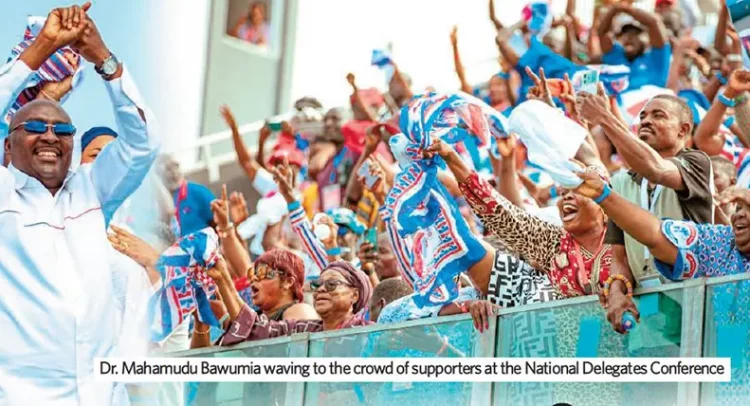The opposition New Patriotic Party (NPP) over the weekend held a pivotal National Delegates Conference at the University of Ghana Sports Stadium, signalling a renewed sense of unity, reform, and purpose following its 2024 electoral defeat.
The well-attended conference brought together over 5,000 delegates, including national, regional, and constituency executives, Members of Parliament, polling station officers, TESCON representatives, and grassroots supporters, all rallying under the theme “Rebuilding Together with Our Values.”
With a strong focus on inclusivity and democratic renewal, the delegates approved 54 out of 56 proposed constitutional amendments, marking a major overhaul of the party’s internal structures and electoral processes. These reforms, party leaders said, are aimed at deepening grassroots participation and strengthening the NPP’s capacity to reconnect with the Ghanaian electorate ahead of the 2028 general election.
General Secretary Justin Kodua Frimpong set the tone for the conference with a stirring speech that called on party faithful to rise above the disappointment of 2024 and embrace a collective vision for renewal.
“This is not just a conference,” he said. “This is a moment of reckoning. A moment of reflection. And above all, a moment of rising.”
Acknowledging the sting of defeat, Mr. Kodua stressed that the party’s spirit remained unbroken. “Yes, the 2024 elections were a blow. But that light has not gone out. It is still burning… and with this conference, with our collective faith and renewed strength, we shall fan that flame into a fire.”
He urged party members to embrace unity, discipline, and principle, reminding them, “We are not broken. We are not defeated. We are builders. We are dreamers. We are fighters. And when we come together, nothing is impossible.”
The party’s foundational values of freedom, enterprise, development, and responsibility, he noted, must guide every action and interaction going forward. “The journey ahead is not a sprint. It is a long and difficult road. But it is a road worth walking. And we will walk it together – shoulder to shoulder, heart to heart.”
The Minority Leader, Alexander Afenyo-Markin, echoed this call, urging the party to rebuild not only its electoral machinery but also its moral centre.
Quoting former President John Agyekum Kufuor, he said: “It is better to be a cleaner in a party in power than the general secretary of a party in opposition.” He added, “These words echo with urgency today… Ghana is now paying the price for trusting the NDC’s hollow promises.”
Mr. Afenyo-Markin described the 2024 loss as a wake-up call, exposing internal rifts and a disconnect from the electorate. “We have not lost our way because we forgot our policies. We have lost our way because we abandoned our principles,” he warned, urging members to return to the core values of service, discipline, truth, and integrity.
One of the most notable outcomes of the conference was the adoption of Motion 45, a constitutional amendment granting voting rights to former constituency and regional executives in the party’s presidential and parliamentary primaries. This move, aimed at fostering inclusion and rewarding long-standing service, modifies Articles 12 and 13 of the party’s constitution.
Chairman of the Constitutional and Legal Affairs Committee, Frank Davies, who presented the motions, said the amendments were in line with the party’s vision to “expand the electoral college for the Presidential Primaries to promote broader participation.”
Delegates also adopted Motion 6, which increases polling station executives from five to seven, incorporating new roles such as Electoral Affairs Officer and Communications Officer, a 40% expansion that aims to reinforce the party’s grassroots structures.
The Committee additionally recommended a future transition to a One-Man-One-Vote (OMOV) electoral system. Until then, the limited expansion approved is expected to significantly broaden the party’s internal voting base.
Motion 50 was another major reform, amending Article 13(11) to allow 30 National Patrons and all members of the National Council of Elders to vote in presidential primaries, a nod to the critical advisory roles these senior party figures play.
Not all motions passed. Delegates rejected Motion 17, which sought to transfer supervision of polling station and electoral area elections to regional executives, as well as Motion 54, which proposed defining ‘Youth’ in the constitution as anyone under the age of 35, in line with international and national standards.
Two additional provisions – Motion 46 and a new Article 12 clause – were also adopted. These require national officers, ministers, deputy ministers, CEOs, and government appointees seeking to contest parliamentary primaries in constituencies with sitting MPs to resign at least 12 months before national elections. Similarly, presidential aspirants must resign 24 months ahead of general elections. The goal is to ensure a level playing field and uphold fairness.
Former ministers, national patrons, and other dignitaries were present, lending their support to what many described as a defining moment in the party’s rebuilding process.
As the conference ended, the message from the leadership was clear: the NPP is not broken, but reawakening. The party aims to transform its defeat into determination and re-emerge as a united force ready to lead Ghana into a new era of hope and opportunity.
By Ebenezer K. Amponsah


